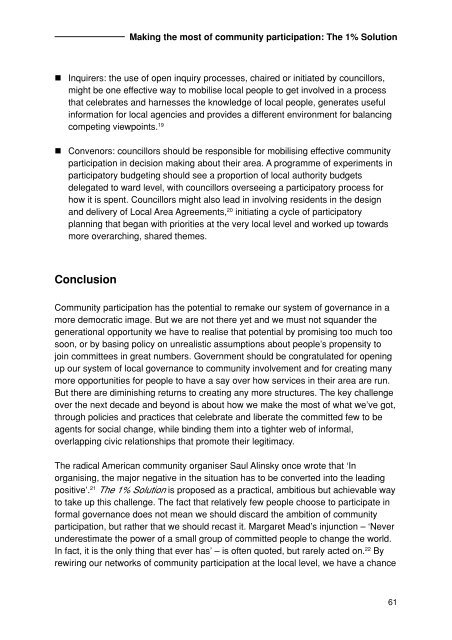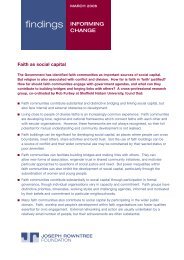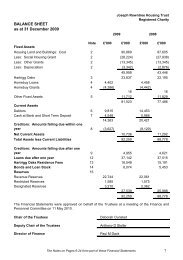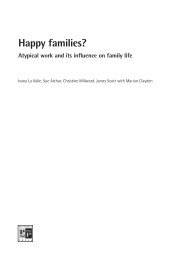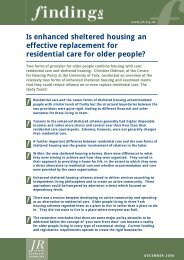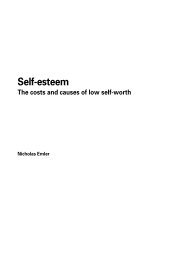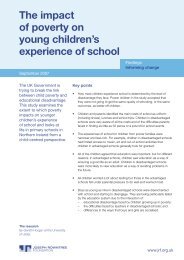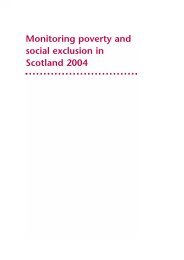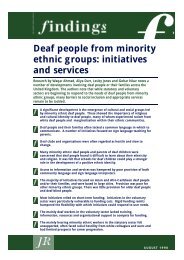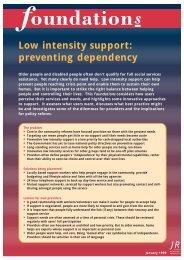Community participation - Joseph Rowntree Foundation
Community participation - Joseph Rowntree Foundation
Community participation - Joseph Rowntree Foundation
Create successful ePaper yourself
Turn your PDF publications into a flip-book with our unique Google optimized e-Paper software.
Making the most of community <strong>participation</strong>: The 1% Solution<br />
<br />
<br />
Inquirers: the use of open inquiry processes, chaired or initiated by councillors,<br />
might be one effective way to mobilise local people to get involved in a process<br />
that celebrates and harnesses the knowledge of local people, generates useful<br />
information for local agencies and provides a different environment for balancing<br />
competing viewpoints. 19<br />
Convenors: councillors should be responsible for mobilising effective community<br />
<strong>participation</strong> in decision making about their area. A programme of experiments in<br />
participatory budgeting should see a proportion of local authority budgets<br />
delegated to ward level, with councillors overseeing a participatory process for<br />
how it is spent. Councillors might also lead in involving residents in the design<br />
and delivery of Local Area Agreements, 20 initiating a cycle of participatory<br />
planning that began with priorities at the very local level and worked up towards<br />
more overarching, shared themes.<br />
Conclusion<br />
<strong>Community</strong> <strong>participation</strong> has the potential to remake our system of governance in a<br />
more democratic image. But we are not there yet and we must not squander the<br />
generational opportunity we have to realise that potential by promising too much too<br />
soon, or by basing policy on unrealistic assumptions about people’s propensity to<br />
join committees in great numbers. Government should be congratulated for opening<br />
up our system of local governance to community involvement and for creating many<br />
more opportunities for people to have a say over how services in their area are run.<br />
But there are diminishing returns to creating any more structures. The key challenge<br />
over the next decade and beyond is about how we make the most of what we’ve got,<br />
through policies and practices that celebrate and liberate the committed few to be<br />
agents for social change, while binding them into a tighter web of informal,<br />
overlapping civic relationships that promote their legitimacy.<br />
The radical American community organiser Saul Alinsky once wrote that ‘In<br />
organising, the major negative in the situation has to be converted into the leading<br />
positive’. 21 The 1% Solution is proposed as a practical, ambitious but achievable way<br />
to take up this challenge. The fact that relatively few people choose to participate in<br />
formal governance does not mean we should discard the ambition of community<br />
<strong>participation</strong>, but rather that we should recast it. Margaret Mead’s injunction – ‘Never<br />
underestimate the power of a small group of committed people to change the world.<br />
In fact, it is the only thing that ever has’ – is often quoted, but rarely acted on. 22 By<br />
rewiring our networks of community <strong>participation</strong> at the local level, we have a chance<br />
61


